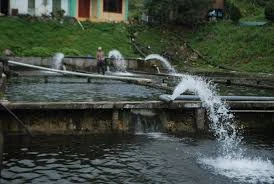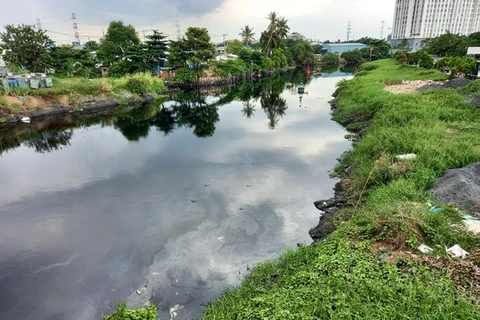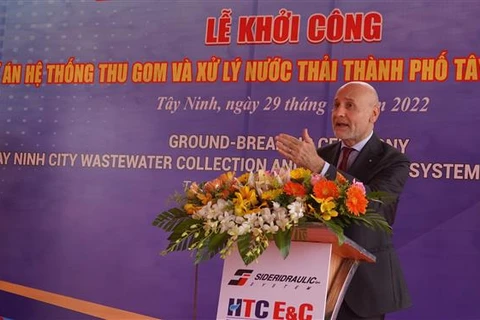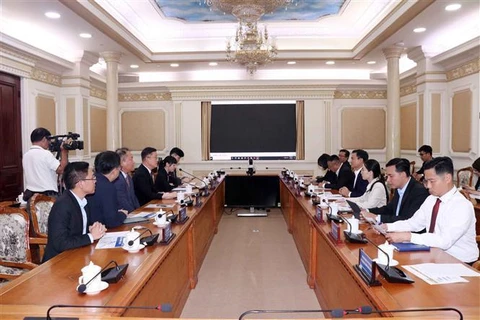 As of 2022, only about 20% of industrial clusters invested in centralised wastewater treatment systems. (Illustrative photo - Source: VietnamPlus)
As of 2022, only about 20% of industrial clusters invested in centralised wastewater treatment systems. (Illustrative photo - Source: VietnamPlus) Hanoi (VNA) - Experts believe that sustainable management and the advancement of technological innovations are key to ensuring a sustainable water supply for industrial, domestic, and urban use.
Assessments by the Ministry of Natural Resources and Environment (MoNRE) indicate that Vietnam is rich in water resources. However, with rapid urbanisation, climate change, and strong industrial activities, the resources are facing significant challenges.
According to the World Bank, the impact of water pollution on the population could reduce the country’s GDP by approximately 3.5% by 2035. In this context, many experts argue that improving wastewater treatment technologies should be an urgent task.
The latest MoNRE statistics revealed that as of 2022, only about 20% of industrial clusters invested in centralised wastewater treatment systems. The remainder either treated wastewater on their own or directly discharged it into the environment.
According to Nguyen Quang Huan, a member of the National Assembly’s Committee on Science, Technology and Environment, and Vice Chairman of the Vietnam Association for Clean Water and Environment, at the 7th session of the 12th Party Central Committee in 2013, the Party issued Resolution 24, which includes specific targets for wastewater treatment. Most recently, the 2020 environmental protection law clearly defines specific criteria for not discharging wastewater into the environment.
He said the wastewater treatment capacity in many urban areas is currently very low. Meanwhile, there are issues with urban planning, technology, policies, regulations, funding sources, and human resources.
Citing a World Bank report, Huan noted that in the next two to three decades, Vietnam may not have enough clean water to use, considering this a very alarming threat.
Regarding the promotion of public-private cooperation in wastewater and solid waste treatment, Vu Tien Loc, a member of the National Assembly's Economic Committee and President of the Vietnam International Arbitration Centre, emphasised that wastewater treatment and management solutions now depend heavily on technological advancements.
He stressed that the target of increasing the rate of wastewater treated from 15% to 70% within the next 10 years [as per the 13th National Party Congress’s Resolution] requires a significant investment, ranging from 10 billion USD to 20 billion USD.
Given such context, the Vietnam Water Supply and Sewerage Association (VWSA)’s Vietnam Water Week 2023, themed “Water for the quality of life and sustainable development”, is taking place at the World Trade Center Binh Duong New City (WTC EXPO) in the southern province of Binh Duong’s Thu Dau Mot city from September 28 to 30.
At the press conference announcing the event, VWSA President Nguyen Ngoc Diep underscored that Vietnam’s water security is facing numerous challenges, requiring the water sector to develop to meet the needs of both daily life and economic development.
Typical technologies introduced at the Vietnam Water Week 2023 include electrochemical technologies for industrial wastewater treatment by a group of scientists from the Singaporean-based Hydroleap company. The technology can reduce up to 95% of pollutants in wastewater, creating favourable conditions for water recycling in many industrial sectors.
Through the adoption of advanced technological solutions, Vietnam is expected to move closer to achieving sustainable development goals by 2030 and completing the national climate change adaptation plan. One of the key objectives is to have 100% of hazardous wastewater treated, with the rate of treated urban wastewater reaching a standard of 50%./.

























